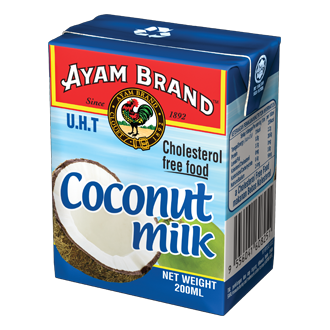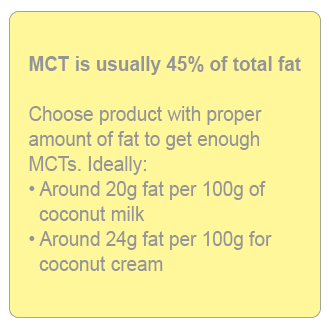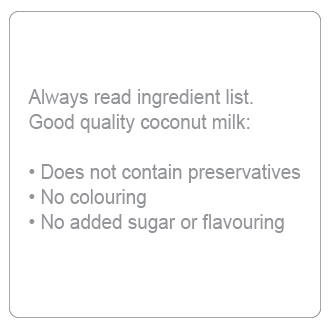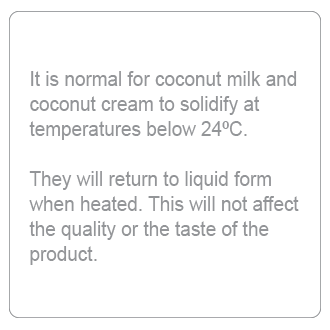THE BENEFITS OF COCONUT MILK
HOW TO CHOOSE YOUR COCONUT
Reference: FOOD FOR THE BRAIN - PROF. SHIRASAWA’S READINGS
 THE BENEFITS OF COCONUT MILK
THE BENEFITS OF COCONUT MILK
Extracts from the book "FOOD FOR THE BRAIN, by Prof. Shirasawa, PHD, MD, anti-aging specialist. ISBN 978-967-14205-0-8"
The benefits of consuming coconut milk are similar to coconut oil, if not better.
Lauric acid, one of the components of coconut milk, is converted in the body into a highly beneficial antiviral and antibacterial compound in the body called monolaurin. This helps destroy a wide variety of disease causing organisms. Hence, it is believed that the consumption of coconut milk may help protect the body from infections and viruses.
Also, coconut milk does not contain lactose. So it is a good substitute for milk for the lactose intolerant,
while being highly and naturally nutritious, rich in fibre, vitamins C, E, B1, B3, B5 and B6
and minerals including iron, selenium, sodium, calcium, magnesium and phosphorous.
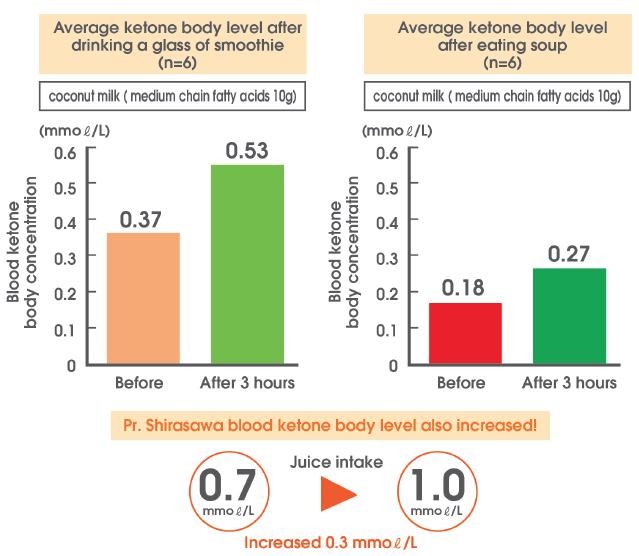 In one of my research on coconut milk in Japan, I conducted a study on the effects of coconut milk on the body’s ketone levels. This study included 12 volunteers, divided into two groups, where I first measured everyone’s ketone levels on an empty stomach.
In one of my research on coconut milk in Japan, I conducted a study on the effects of coconut milk on the body’s ketone levels. This study included 12 volunteers, divided into two groups, where I first measured everyone’s ketone levels on an empty stomach.One group of six volunteers consumed a carrot smoothie with coconut milk, while the other six consumed an oyster soup made with coconut milk.
I made sure both recipes had 66g of coconut milk, which translated into 10g of medium chain fatty acids (MCFAs). After 3 hours, I measured their ketone levels again. As in Figure 3, the left side is the carrot smoothie; while the right side is the oyster soup. The orange column is the level of the ketone bodies on an empty stomach, the green column is the level 3 hours after consumption of the coconut milk. In both groups, I could confirm that the levels went up after ingesting coconut milk.
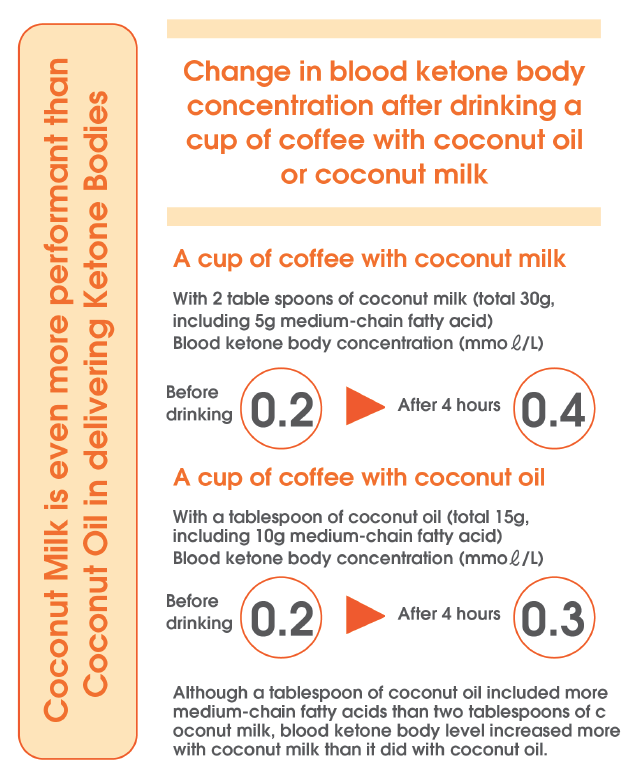 In another test, I compared drinking coffee with coconut oil and coffee with coconut milk. In both drinks, the coffee base was the same. But in one cup of coffee, I added 2 tablespoons of coconut milk (30g/5g of medium chain fatty acids) and in the other I added 1 tablespoon of coconut oil (15g/10g of medium chain fatty acids).
In another test, I compared drinking coffee with coconut oil and coffee with coconut milk. In both drinks, the coffee base was the same. But in one cup of coffee, I added 2 tablespoons of coconut milk (30g/5g of medium chain fatty acids) and in the other I added 1 tablespoon of coconut oil (15g/10g of medium chain fatty acids).
The base line was the same, 0.2mmol/L. After 4 hours of drinking the coffee, my ketone levels went up to 0.4 mmol/L in the case of coconut milk coffee, and only 0.3 mmol/L in the case of coconut oil coffee.
This experiment shows that coconut milk is actually even more effective than coconut oil in raising the ketone levels.
Another advantage of the coconut milk over coconut oil is the calorie count.
100g of coconut oil contains 900kcal while 100g of coconut milk contains only 245kcal.
As you can see, there is a better result from coconut milk, especially if you want to lose weight fast.
"All above text are direct quotes from Prof. Shirasawa book and they are presented here for information about the latest findings about coconut benefits. These information can not be seen as a recommendation to modify or alter a medical treatment. Like any other good food ingredient, coconut can bring benefits only within a proper balanced diet and regular physical exercises."
Reference: FOOD FOR THE BRAIN - PROF. SHIRASAWA’S READINGS























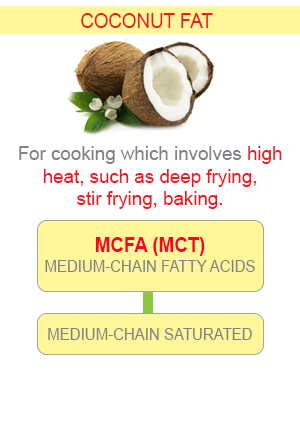 To understand what makes coconut fat most remarkable even with its traditionally miraculous history, is to understand its properties and how the body responds to it.
To understand what makes coconut fat most remarkable even with its traditionally miraculous history, is to understand its properties and how the body responds to it.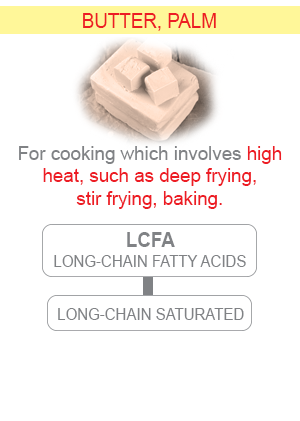
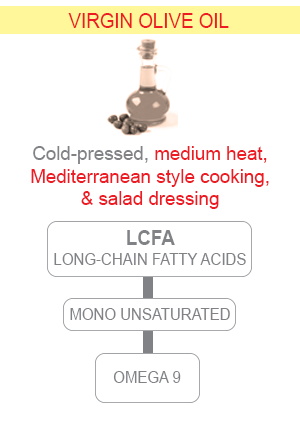
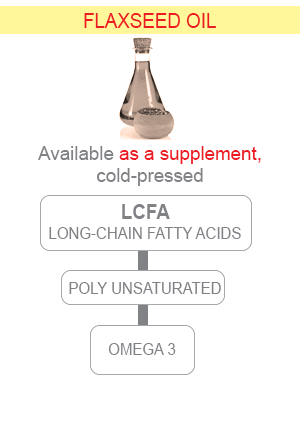
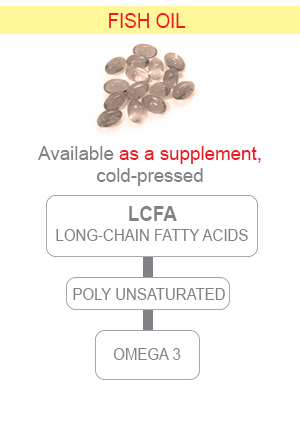
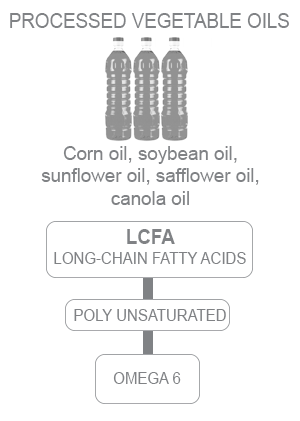
 A 1986 study by T. B. Seaton et al in the American Journal of Clinical Nutrition that showed people who ate meals containing medium-chain fatty acids increased their metabolic rate an average of 12%, compared to only 4% in those eating meals with long-chain fatty acids. This helps prove the theory that the body uses virgin coconut oil for energy and does not store it as fat thus promoting weight loss.10
A 1986 study by T. B. Seaton et al in the American Journal of Clinical Nutrition that showed people who ate meals containing medium-chain fatty acids increased their metabolic rate an average of 12%, compared to only 4% in those eating meals with long-chain fatty acids. This helps prove the theory that the body uses virgin coconut oil for energy and does not store it as fat thus promoting weight loss.10 Inflammation, characterised by various white cells attracted to a site of infection or derangement, is the body’s mechanism for defence or for readjustment and healing. When successful, the inflammation disappears by itself. But when unsuccessful, the inflammation persists, becomes chronic, and eventually becomes the disease itself, producing further symptoms and complications.
Inflammation, characterised by various white cells attracted to a site of infection or derangement, is the body’s mechanism for defence or for readjustment and healing. When successful, the inflammation disappears by itself. But when unsuccessful, the inflammation persists, becomes chronic, and eventually becomes the disease itself, producing further symptoms and complications.